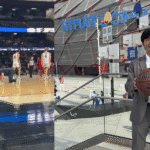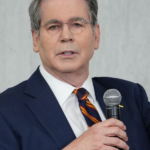Bryan Caplan doesn’t mince words: “Protectionists are just fools,” he said.
“Anger is his muse,” Caplan said, describing how his father spends hours listening to talk radio, furious at foreigners “for selling us stuff.”
YIMBYism has tended to cluster on the coasts, especially blue cities plagued by housing crises and chronic underbuilding over decades, but Caplan has thought (and written) a lot about what he calls the “lost middle,” the people who live in tent cities because they narrowly can’t afford the cheapest housing possible. He is unashamed to say that we should build cheaper, lower-quality housing for this middle, or that we should give them decaying housing.
Factories, Caplan thinks, are a dead end. U.S. manufacturing output is near record highs, but employment has collapsed, he noted: not because of China, but because of machines.
“Automation has made every manufacturing worker extremely productive, which means there just aren’t going to be a lot of jobs there,” he said. “It’s like agriculture; we can produce more food than ever, but we don’t need millions of farmers anymore.”
Housing, by contrast, is bursting with “pent-up demand,” Caplan said. Millions of Americans want bigger, cheaper homes, but zoning laws, parking requirements, and minimum lot sizes keep supply limited.
That argument makes Caplan a contrarian not only to Trump, but to many conservatives who see protectionism as the answer to Rust Belt decline.
“Politics is social,” Caplan sighed. “Even if protectionism is a bad bandwagon, everyone gets on it together.”
Next on Caplan’s deregulation list are bans on multifamily housing and strict height limits in cities. If land is valuable, people will naturally want to build apartments and townhomes, but currently builders are forced to leave land empty.
Parking minimums are the last policy, one which he admits is “incredibly popular.” In many cities, developers are required to build two or three spaces per apartment unit, even if renters don’t own cars, driving up the price of every individual unit.
Though these policies might seem like trite technicalities, to Caplan, they are the bottlenecks keeping millions of homes from being built, and non-college-educated men from finding work building them.
Here, Caplan finds an odd bedfellow in his YIMBY coalition: popular liberal economics writer Matt Yglesias, who has criticized parking minimums ever since his days blogging for The Atlantic and the Center for American Progress. (That was long before Yglesias became one of the most successful Substackers going with Slow Boring, or even before he cofounded Vox with Ezra Klein.)
Caplan acknowledges that it is precisely in rural areas where demand for housing is nonexistent. But he argues that rural Americans don’t need to live close to a skyscraper to secure a construction gig and benefit from deregulation.
Instead, they could commute to nearby growth hubs, places like Madison, Wis., or parts of Ohio and Pennsylvania where housing demand is strong.
“Even if you live in a town that’s declining, you might drive 50 miles and be on a booming construction site,” Caplan said. “That’s already how construction works. The jobs are mobile.”
He imagines a kind of cascade effect, where experienced workers would return to the industry as wages rose, while others could start in entry-level laborer roles. From there, the job site becomes the classroom, with workers teaching one another—the way that “most jobs work,” Caplan said.
For those willing to relocate, deregulation could also ease the very barrier that makes migration costly: high rents in booming cities. Caplan envisions temporary worksite housing to solve that problem.
“It’s a chicken-and-egg problem,” he said. You can’t build more housing without workers, and you can’t get more workers without housing. Deregulation solves both.
The result, he argues, would be millions of non-college-educated men doing work that feels tangible and high-status.
“I think construction is even more emotionally satisfying for this ideal of manhood that a lot of people still have,” Caplan said. “You wake up, grab your tools, and build something outdoors—that feels higher-status than being stuck inside on an assembly line.”









